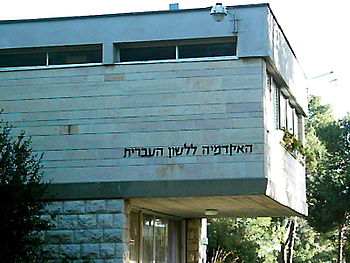| האקדמיה ללשון העברית | |
 | |
| Formation | 1890 – Hebrew Language Committee 1953 – Academy of the Hebrew Language |
|---|---|
| Founder | Eliezer Ben Yehuda |
| Type | Governmental organization |
| Legal status | Language regulator |
| Purpose | To regulate the Hebrew language |
| Headquarters | |
| Coordinates | 31°46′20.34″N 35°11′54.71″E / 31.7723167°N 35.1985306°E / 31.7723167; 35.1985306 |
| Region served | Hebrew-speaking population |
| Official language | Modern Hebrew |
| President | Aharon Maman |
| Staff | 38 |
| Website | hebrew-academy |
| Formerly called | Hebrew Language Committee |
The Academy of the Hebrew Language (Hebrew: הָאָקָדֶמְיָה לַלָּשׁוֹן הָעִבְרִית, ha-akademyah la-lashon ha-ivrit) was established by the Israeli government in 1953 as the "supreme institution for scholarship on the Hebrew language in the Hebrew University of Jerusalem of Givat Ram campus."
Its stated aims are to assemble and research the Hebrew language in all its layers throughout the ages; to investigate the origin and development of the Hebrew tongue; and to direct the course of development of Hebrew, in all areas, including vocabulary, grammar, writing, spelling, and transliteration.
Since 2022, the Academy has been headed by Moshe Bar-Asher. It is composed of 42 members, in addition to having members who serve as academic advisors, as well as honorary members. Every person is entitled to query the Academy on language matters and to receive a formal reply.
History

The Academy replaced the Hebrew Language Committee (Vaʻad ha-lashon ha-ʻIvrit) established in 1890 by Eliezer Ben-Yehuda, who was its first president. As Hebrew became the spoken language in Palestine and was adopted by the educational system, the Hebrew Language Committee published bulletins and dictionaries. It coined thousands of words that are in everyday use today.
Its successor, the Academy of the Hebrew Language, has continued this mission of creating new Hebrew words to keep up modern usage.
Although the academy's business is creating new words from Hebrew roots and structures to replace loanwords derived from other languages, its own name is a loanword, "akademya." It addresses this irony on its English website.
The Academy's mission, as defined in its constitution, is "to direct the development of Hebrew in light of its nature" (לכוון את דרכי התפתחותה של הלשון העברית לפי טבעה). The Academy sets standards for modern Hebrew grammar, orthography, transliteration, and punctuation based on the historical development of the language. It also writes a Hebrew Historical Dictionary.
Organization
The plenum consists of 42 members. In addition, the Academy employs 8 academic advisors, among them respected scholars of language, linguistics, Judaic studies, and Bible. It also has 9 honorary members. The Academy's decisions are binding on all governmental agencies, including the Israeli Public Broadcasting Corporation.
See also
- Study of the Hebrew language
- List of language regulators
- Revival of the Hebrew language
- Historical Dictionary Project of the Hebrew Language
- Autoridad Nasionala del Ladino, a language regulator for Ladino
- YIVO (Yidisher Visnshaftlekher Institut), a language regulator for Yiddish
- Academy of the Arabic Language in Israel
References
- Minority Languages and Language Policy: The Case of Arabic in Israel Archived April 26, 2012, at the Wayback Machine
- The New Jewish Encyclopedia, ed. David Bridger
- "Hebrew Academy". Archived from the original on 2018-05-16. Retrieved 2018-03-09.
- When Should Foreign Words Be Replaced By Hebrew Words?
- Ghil'ad Zuckermann argues that this is an "oxymoronic" mission impossible: "If the nature of a language is to evolve in a specific direction, why direct it by language policing?", see Zuckermann, Ghil'ad (2008), Realistic Prescriptivism: The Academy of the Hebrew Language, its Campaign of "Good Grammar" and Lexpionage, and the Native Israeli Speakers. Israel Studies in Language and Society 1, pp. 135–154.
- According to Zuckermann, "the Historical Dictionary Project is the Academy's most important contribution", see Zuckermann, Ghil'ad (2008), Realistic Prescriptivism: The Academy of the Hebrew Language, its Campaign of "Good Grammar" and Lexpionage, and the Native Israeli Speakers. Israel Studies in Language and Society 1, pp. 135–154.
- Hebrew Academy membership (official site)
External links
- Official website. Archived 2018-05-16 at the Wayback Machine.
- Rothberg International School The Hebrew University of Jerusalem
| Hebrew language | |||||||||||||
|---|---|---|---|---|---|---|---|---|---|---|---|---|---|
| Overviews | |||||||||||||
| Eras | |||||||||||||
| Reading traditions | |||||||||||||
| Orthography |
| ||||||||||||
| Phonology | |||||||||||||
| Grammar | |||||||||||||
| Academic | |||||||||||||
| Reference works | |||||||||||||